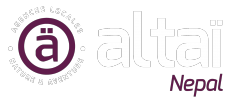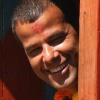Kanchanjangha, Makalu and Limbus villages
Itinerary
-
Day 1 Arrival
Welcome to Kathmandu! Your guide will greet you and escort you to your hotel. Depending on your arrival time, perhaps your trip leader can show you the old streets of Ason Tole and Indra Chowk and introduce you to the Nepalese way of living.
Accommodation: Hotel
Meals not included -
Day 2 Kathmandu
Today we visit the Nepalese capital, starting with the Buddhist Temple of Swayambhunath (also known as the "Monkey Temple") which overlooks the emerald valley of Kathmandu. We continue with the discovery of Patan, one of the three ancient imperial cities of the valley. It has been primarily Buddhist since the 3rd century BC and is known for its monasteries and colourful courtyards. Durbar Square of Patan, with its palace and Hindu pagodas is a UNESCO heritage site. We can enjoy lunch in a peaceful historic courtyard and explore the area before our late afternoon return to the hotel.
Accommodation: Hotel
Meals not included -
Day 3 Kathmandu/Bhadrapur. Visit Jhapa
Early morning flight Kathmandu/Pokhara. A spectacular flight leads to the East Terai of Nepal, at the border of India, near Darjeeling. Let us take some time to discover the small villages scattered among the rice fields here. We walk from village to village and soak in the charming atmosphere of Terai where rice, palm trees, and banana trees flourish.
Walking: 2 hours - discovery of villages in Terai
Flight: Kathmandu-Bhadrapur
Accommodation: Homestay with lunch and dinner -
Day 4 Jhapa – Ilam
After breakfast, we have a short dive and we discover the first tea plantations in Jhapa. We then leave the subtropical Terai region for the mountains and tea of Ilam, capital of Nepal tea for 150 years. Walking tour of tea plantations at Kanyam and we visit a factory to see the different stages of making tea. Late afternoon, we arrive at our hosts’ home where we spend a pleasant evening together.
Walking: 4 hours (+/- 400m)
Transport: 4 hours drive
Picnic lunch in the Tea Gardens of Ilam
Accommodation: Homestay with dinner -
Day 5 Ilam - Gaunthali (1200m)
We continue along a scenic road through the mountains and the Nepalese countryside. In Ranke, we get our first glimpse of the giant Himalayan peaks: Kanchenjunga (8586m) and Janu (7710m), the sacred mountain of the Limbe people and probably one of the most beautiful mountains in the Himalayas. We visit a cheese factory in Baghkhor on the way and then our hike begins in Kanchhi Dokan. From here we head down to the village of Gauthali.
Walking: 3 hours (-350m)
Transport: 3 hours drive
Lunch: Picnic on the heights of Phidim
Accommodation: Homestay with dinner -
Day 6 Gaunthali - Phidim - Jorsale (800m)
We begin our trek amid lush paddy fields, banana plantations, orange trees and bamboo groves. It is quiet trail through the lush greenery to our lunch spot in Phidim - the capital of the region. We descend to the banks of the Tamor River through a subtropical forest which takes its source at the foot of Mount Kanchenjunga. Tonight we sleep in tents by the side of the river.
Walking: 5 hours (-120m)
Lunch: Local restaurant
Accommodation: in tents on the Tamor Riverbank with dinner -
Day 7 Majhitar - Chuhandanda (1650m)
After a peaceful night near the river, we leave the Tamor Valley and climb up to a higher region. The climb is relatively steep in the beginning. Shortly after, the trail offers beautiful views over the valley and river below. We continue upwards to where seasonal crops bloom: rice, wheat, sugar canes, etc. In the beautiful nature, under a mango tree, we stop for a picnic lunch prepared by the team this morning. We continue our uphill trek to the beautiful lively village of Chuhandanda.
Walking: 5 hours (+850m/-400m)
Accommodation: Homestay with lunch and dinner -
Day 8 Chuhandanda - Samthang (2300m)
We climb a relatively steep trail to Deudi then continue steadily to Sakranti Bazaar. We make a short detour to visit Bhagawatisthan – a pilgrimage for local people. Then we arrive at Sakranti Bazaar, the old market and the main town of the region, where we have lunch and admire a forest of giant rhododendron trees. After lunch, the trail is flat and then climbs gradually upwards to Samthang village at 2300m.
Walking: 5 hours (+650m)
Lunch: Local restaurant
Accommodation: Homestay with dinner -
Day 9 Samthang - Khamlalung (2205 m)
We are already fairly high up in the iconic Nepalese mountains. From Samthang, we enjoy a day hike along the ridges overlooking the lush valleys, carved terraces and of course the towering Himalayas. We can enjoy panoramic views of the mountains. After lunch, we walk to Khamlalung, a beautiful village on the edge of a beautiful temperate forest.
Walking: 4 hours (-100m)
Lunch: With locals in their home
Accommodation: Homestay with dinner -
Day 10 Khamlalung - Gupha Pokhari (2960 m)
Today is the toughest day of our trek with alternating ups and downs. We cross a dense rhododendron forest, beautiful chestnut trees, and follow a ridge which overlooks several valleys, forests and summits. With a relaxed pace, we walk to the Sherpa village of Gupha Pokhari. From this settlement, the views are simple fabulous of Kanchenjunga and Janu; Baruntse (7129 m), Chamlang (7319 m) and Makalu (8481 m). The peaks are reflected in the clear waters of the holy lake of Gufa Pokhari.
Walking: 7 hours (+1150/-500)
Lunch: Picnic lunch
Accommodation: Lodge with dinner -
Day 11 Gupha Pokhari (2960 m) - Chwoki (2680 m)
Early in the morning, we enjoy a splendid sunrise over the Himalayan peaks, the colours reflect in the sacred lake Gupha Pokhari illuminating the whole valley. The giant peaks turn golden with the glowing morning rays of sunlight - it is a pleasure to witness. We are in the area with the greatest variety of rhododendrons, the national flower of Nepal. We can also see herds of Yaks here. After breakfast, we start our walk along a ridge which overlooks the valley of Makalu and the valley of Kanchanjunga. Our destination is the Chowki Village. Lunch and night at the same place surrounded by mountains and dense forests of rhododendrons.
Walking: 4 hours (+/- 300m)
Lunch: local restaurant
Accommodation: Lodge with dinner -
Day 12 Chwoki - Kande - Biratnagar
After breakfast, we continue along a flat trail before a beautiful descent through the temperate forest to the village of Kande, the end of our unforgettable trek. We then take the road to Biratnagar through the mountains of Hile and Dhankuta to Terai - where our hike began a few days ago.
Walking; 3 hours (-600m)
Lunch: local restaurant
Accommodation: Hotel with dinner -
Day 13 Biratnagar - Kathmandu
Morning, we take a flight from Biratnagar to Kathmandu. Afternoon at leisure soaking in the unique atmosphere of this city.
Flight Biratnagar - Kathmandu
Accommodation: Hotel
Meals not included -
Day 14 End of stay
End of stay
Dates & prices
International departures:
No departure for now
Trip code: NEPILAM-EN
Included
- All in-country transfers as detailed in itinerary
- 3 * hotel accommodation in Kathmandu (Hotel Tibet, Manaslu or similar)
- 2 * hotel accommodation in Biratnagar (Hotel Pancholi or similar)
- Trek includes full-board and lodging
- Accompaniment by an English speaking Altaï Guide
- Domestic flight Biratnagar - Katmandou
- Visits as per itinerary with a cultural guide in a private vehicle
- Luggage transfers - up to 12kg maximum per person during the trek
- Trekking support team: assistants and porters
- Trekking permits: ACAP and TIMS
- Staff Insurance
- Local taxes
Not included
- Entrance to historical sites & monuments
- Meals in Kathmandu & Kathmandu Valley
- Nepalese visa: US $ 25
- International flights
- Insurance: Repatriation, Medical & Helicopter Services
- Drinks, tips and personal expenses - all that is not 'included'
Notes
Level 3/5
Terms and conditions
Booking conditions
Invoice procedure
Cancellation policy
- Cancellation received more than 30 days prior to the departure date: a sum of €50 per person will be retained
- Cancellation received 30 to 21 days before the departure date: your deposit, 30% of the total trip price will be retained
- Cancellation received 20 to 14 days before the departure date: 50% of the total trip price will be retained
- Cancellation received 13 to 7 days before the departure date: 75% of the total trip price will be retained
- Cancellation received less than 7 days before the departure date: 100% of the total trip price will be retained
- Fixed airfares: if your airline ticket was issued in advance, often done to avoid significant surcharges, you will be charged 100% of any non-refundable fees if you wish to change or cancel your flight plan.
- Fixed in-country costs: early charges for firm bookings will be charged if you cancel or modify your trip.
- Insurance costs: if you have taken out comprehensive or cancellation insurance, the cost of insurance is due and cannot be refunded.
Changes to travel contract
Pricing
Contract transfer
Insurance
Practical info
Staff
Food
Accommodation
Transportation
Budget & exchange
Tips
Vital equipment
- Warm Sleeping Bag
- Water purifiers (micropur, aguatabs ...)
- A cap or sunhat
- 1 or 2 sets of thermals: long-sleeved thermal tops and full-length long johns
- Long sleeved and short sleeved t-shirts, preferably in quick-drying technical material
- A light fleece or equivilent (plus extra warm layers if necessary)
- A breathable wind proof, waterproof jacket (Gore-Tex...)
- Lightweight waterproof over trousers
- Suitable shorts
- Walking trousers
- A pair of high-rise walking boots with vibram soles - trails can be rocky and muddy
- A pair of trainers/sandels or equivilent casual shoes for cities, villages and evenings
- Thick walking socks
- Warm gloves, hat and scarf (it can be chilly in the mountains)
Material
- Your personal toiletries and a fast drying towel
- Water bottle(s). Min. 2 litres, light and isothermal
- A good pair of sunglasses (think min. category 3)
- Sun-cream, face and lips
- Head torch and spare batteries
- A pocket knife
- A pair of hiking poles
- A waterproof bag cover (or plastic bags) to protect your belongings
- Toilet paper
- Anti-bacterial hand gel
- Your camera
- A notebook or travel journal
Helpful equipment
- Your personal toiletries and a fast drying towel
- Water bottle(s). Min. 2 litres, light and isothermal
- A good pair of sunglasses (think min. category 3)
- Sun-cream, face and lips
- Head torch and spare batteries
- A pocket knife
- A pair of hiking poles
- A waterproof bag cover (or plastic bags) to protect your belongings
- Toilet paper
- Anti-bacterial hand gel
- Your camera
- A notebook or travel journal
Luggage
- A rucksack (35-40L or 45-50L) for use as a day bag. This will contain your (vital) personal belongings for the day (sweater, spare t-shirt, water bottle, picnic-lunch, sunglasses, small things ... )
- A larger bag (60-80L) containing the rest of your belongings, which can be safely stored in Kathmandu.


